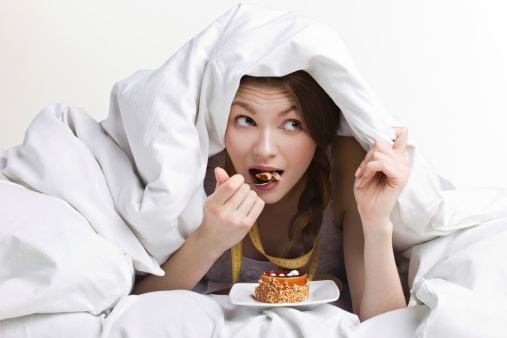
Are people really drawn to food when they’re down? The answer is an overwhelming YES! People eat for pleasure and to get energy, but they also eat to make themselves feel better. The food industry understands the emotional connection we have with food and has subsequently taken advantage of this. The way food is packaged; how it smells; what it looks like; and the level of sweetness, saltiness, and spiciness can have an impact regarding how much of this product we consume at any given time.
Our food choices are greatly impacted by our emotional status, and when and why we eat them certainly is, as well. Have you ever felt like eating “comfort foods” when you are not feeling well? Do you eat certain foods when you are angry, sad, or happy? Scientists call this “emotional eating”—and emotional eating is usually overeating.
Typically, the assumption is that overeating or binge eating may be related to negative emotional feelings, but current findings have also shown that feel-good eating can also pack on unwanted calories. Also, the people who have a tendency towards emotional eating are more likely to eat sweet foods; have you eaten a ton of chocolate after a stressful event?
What about the link between stress, depression, and unhealthy eating practices? Is there a definite link? That answer is also a resounding YES! There is a great deal of research indicating the associated anxiety and depression caused by high levels of stress can directly lead to unhealthy eating behaviors. Not only that, but unhealthy eating behaviors, like binging and purging, are quite commonly associated with many types of emotional feelings, some of which include a history of repeated dieting, fear of gaining weight, and poor body image.
There is also a great deal of research on the link between emotional eating behavior and eating disorders. Eating disorders are very common, especially among younger women; this alarming statistic really removes all doubt as to the emotional connection to overeating. Many women feel a great deal of pressure to be thin and look a certain way, so their relationship with food can become dysfunctional quite early on. They’ll see overeating as a reward system, then as a method of dealing with stress, which can evolve into binge-eating.
Food addiction is also an area of food and nutritional research that has received a great deal of attention in the last decade. I believe this to be the case because food addiction is very common and can lead to unnecessary weight gain, binge eating, and bulimia. In fact, research has found that 50% of people who consider surgery to manage their obesity have a food addiction.
What can you do if you’re Overeating or Turning to Emotional Eating?
Get to the root of the problem. If you reward yourself with food every time you’re happy or sad, your body and mind will get used to it. Instead, stop gravitating towards food when you’re emotional. Distract yourself by going for a walk, watching T.V., or reading a book. Then, once the cravings have subsided, think about why you felt you needed that cookie or piece of cake. Tell yourself that you’re strong and can withstand food addiction cravings.
Sources:
Bongers, P., et al., “Happy eating: The underestimated role of overeating in a positive mood,” Appetite April 10, 2013; 67C: 74-80.
van Strien, T., et al., “Emotional eating and food intake after sadness and joy,” Appetite March 5, 2013; 66C: 20-25.
Hou, F., “Effects of emotional symptoms and life stress on eating behaviors among adolescents,” Appetite April 18, 2013.
Peneau, S., et al., “Sex and dieting modify the association between emotional eating and weight status,” Am J Clin Nutr. April 10, 2013, published online ahead of print.
Webb, J.B., et al., “Evaluating the indirect effect of self-compassion on binge eating severity through cognitive-affective self-regulatory pathways,” Eat Behav. April 2013; 14(2): 224-8.
Clark, S.M., et al., “Validation of the Yale Food Addiction Scale among a weight-loss surgery population,” Eat Behav. April 2013; 14(2): 216-9.













